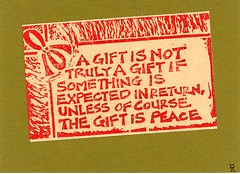Our Confirmation class is participating in an interfaith program called "Children of Abraham" with other middle school students who are Jewish and Muslim. From what I can see, thus far it's been a great experience for our confirmands--a chance for them to learn about other faiths while also growing into their own. In addition to the program for the youth, the organizers have also developed a parallel program for the parents and other adults, which I went to for the first time on Saturday evening. I learned a lot--a lot of facts that I didn't know, especially about Islam, but I learned the most, I think, just from the interactions.
There were five of us Christians (all Methodists), two liberal Jews and two Muslim women. That's pretty much how the students break down, too--about half the group is Methodist, and the other half is about equally divided between Muslims and Jews. I was thinking about this lopsidedness on the part of the Christians and I think it's because for us interfaith dialogue isn't all that risky. We are the majority religion in this country, numerically, but in other ways, too, and for us, we don't have much to lose.
But what I noticed, particularly with the Muslim women, they seemed to be taking a big risk. Since September 11th, Muslims in this country (and in most of the world, really) have been put under a microscope. Sometimes the motivation to look more closely has been positive, like in this program, because we want to learn more about this religion and join together with moderate Muslims to combat fundamentalism of all kinds.
But other sorts of scrutiny are less benign. Especially since September 11th, many people have begun to look at Muslims with suspicion, fear, even hatred. And sometimes in these interfaith dialogues moderate Muslims are expected to speak for the whole faith, to respond to, even take responsibility for fundamentalists and terrorism.
It seemed to me that there was some fear about this kind of scrutiny on the part of our Muslim participants. They seemed reticent to talk, to share, to fully participate. During one exercise when we were asked to imagine and draw images of interfaith peace, they didn't do it. I am not entirely sure why, but from the explanation that one of the women gave, it seemed to me that she had a hard time even imagining what interfaith peace might look like. And that made me feel very sad.
Overall, I think that interfaith dialogues are a positive thing. When they are done right, they are hard work, but that's good. We need to work hard at this--the future of our world depends on it.
One of the exercises that the youth did together last Saturday was plant flower seeds. They wrote prayers for peace on the sides of the flower pots and then traded them with each other. They are supposed to tend to these seeds, to nurture them so they will grow. I pray that these will not be the only seed that are planted in them, and that out of this experience will grow peace.
Gift of Peace
Originally uploaded by YardSale.


3 comments:
Wow! That sounds great. I have not heard of the program before. How did it come to be?
It came to be when a Jewish woman got a grant to develop such a program for interfaith youth and developed it, working with Christian and Muslim partners. This is a pilot program and they hope to develop a curriculum so that it can be replicated. I will definately let you know if it is!
Here's an article about the program from the Washington Jewish Week http://www.washingtonjewishweek.com/main.asp?SectionID=4&SubSectionID=4&ArticleID=6686&TM=68168.55
Post a Comment